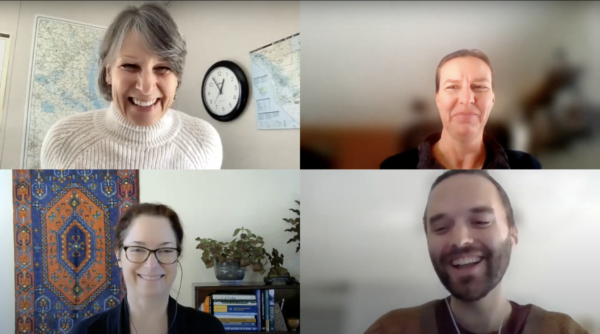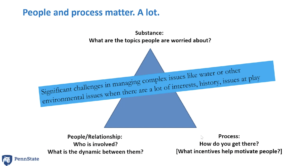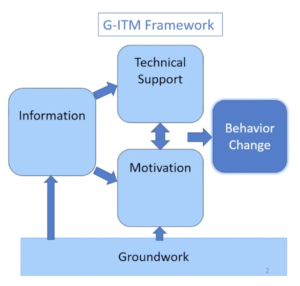Behavior and the Bay: The Human Dimension of Chesapeake Bay Restoration

Denice Wardrop, executive director of CRC, moderated the webinar with three expert speakers that provided a unique perspective on integrating social science into the restoration effort and briefly summarized some ongoing efforts focusing on what they’ve learned and what’s next: Lara Fowler, Pennsylvania State University; Daniel Read, University of Maryland Center for Environmental Science, Chesapeake Biological Laboratory (UMCES CBL); and Lisa Wainger, UMCES CBL.
Takeaways from the webinar

Lara Fowler (Senior Lecturer, Penn State Law; Assistant Director, Penn State Institutes of Energy and the Environment; Affiliate Faculty, Penn State School of International Affairs) is an attorney and trained mediator focusing on environmental energy and natural resource law. She has worked as a facilitator and mediator on a number of complex and challenging water issues in the West, and contributed guidance to minimize conflict.
- It takes time to build up trust and for people to engage with each other to find solutions; the adage, “progress happens at the speed of human relationships” holds true.
- Conflict arises over one of three elements: content (what topic area are people thinking about), people and relationships (who is involved and what is the history and dynamic between them), and process (how is the discussion and consideration being handled). While most people engaged in conflict believe that content is the issue, it is much more commonly about people or process.
- Challenges in the water and water quality space are grand and the history of events or things that have played out over time must be taken into consideration when moving forward.
- Several discussions and projects have taken place within the Chesapeake Bay, including workshops and forums about advancing outreach effectiveness, human behavior in effective agricultural conservation practices, transition to climate smart agriculture, and more.
 Lisa Wainger’s (UMCES CBL) work emphasizes the spatial variability of the benefits we get from ecosystems and applies that understanding to create decision support tools for prioritizing restoration and preservation efforts. She mentioned two ongoing projects – Thriving Agriculture and Urbanizing Landscapes, and Social Science Roadmap – and explained the science behind behavioral intervention.
Lisa Wainger’s (UMCES CBL) work emphasizes the spatial variability of the benefits we get from ecosystems and applies that understanding to create decision support tools for prioritizing restoration and preservation efforts. She mentioned two ongoing projects – Thriving Agriculture and Urbanizing Landscapes, and Social Science Roadmap – and explained the science behind behavioral intervention.
- Behavioral interventions, which are actions taken to influence behavior, are hypothesis driven and testable. Several goals of the partnership are to promote pro-environmental or pro-social behaviors and to understand what attempts work and why. This framework, including groundwork, information, technical support, and motivation, are all taken into account when trying to understand how people make decisions.
- The purpose of the Social Science Roadmap is to provide a summary of the state of the science, both for public actors and policy actors, and to generate products that promote and enhance good collaborations with social scientists.
- The project team conducted a behavioral literature review of several public interventions that have been done to promote pro-environmental behaviors. A key takeaway was that information-only interventions were less effective than when combined with other interventions, like psychology-based motivations. For example, telling people pet waste is harming the Bay is not enough to get them to change, but when you combine that with bag dispensers and social norm nudges, you can change behavior.
Daniel Read (UMCES CBL) is an environmental anthropologist who explores how people view, act towards, and are affected by environmental policy to suggest new directions for conservation that are grounded in people’s lived experiences. His postdoctoral research investigates how technical assistance providers engage with farmers about soil and water conservation in the Chesapeake Bay watershed and he discussed the Thriving Agriculture project.
- The Thriving Agriculture project focuses on best management practice (BMP) adoption in agricultural landscapes with the goal of creating an evidence base of what works when engaging farmers and encouraging them to adopt BMPs, which can then be used to inform effective outreach.
- A literature review for the project collected 145 studies from 43 different countries and examined the effectiveness of different interventions, such as exposure to media messages about conservation, attending conservation outreach events, contacting a technical assistance provider, receiving financial incentive to adapt, or being a member of peer learning group, at promoting the adoption of conservation practices.
- The key takeaway from the quantitative and qualitative analyses performed were that financial incentives are the most likely intervention to be successful at promoting BMP adoption. Read iterated that the qualitative and quantitative data are complementary and can aid in interpreting each other and study quality is important when conducting reviews.
Resources for further action
- How to Get to Know Communities and Cultures: Methods for Remediation, Removal, and Redevelopment Projects
- Behavior Change Forum hosted by Chesapeake Bay Trust
- Webinar Recordings from STAC’s series of conversations on COVID
- Collaborating for Effective Agricultural Technical Assistance
- 2021 All-Bay Ag Network Forum
- USDA-funded Water for Ag
- Center for Behavioral & Experimental Agri-Environmental Research (CBEAR)
- Advancing Scholarship and Practice of Stakeholder Engagement in Working Landscapes
- Advancing Outreach Effectiveness to Improve Conservation Practice Adoption: a virtual series of morning coffee hour discussions to improve private-public partnerships
- Overcoming the Hurdle: Addressing Implementation of Agricultural Best Management Practices (BMPs) Through a Social Science Lens
Next steps
The Chesapeake Bay Trust is hosting its first Behavior Change forum to discuss best practices, synthesize current and future needs in research, and explore how behavior change programs can translate to water quality goals. “Behavior Change in Stewardship Practices: A Virtual Forum on the State of the Science and Water Quality Implications” will take place on February 10th from 9am – 5pm.
